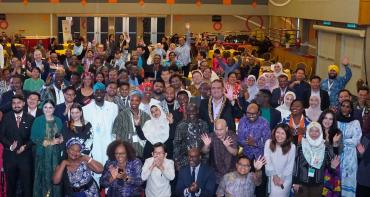Young people have a role to play in ensuring good governance by keeping watch on all branches of the State, writes Angelique Pouponneau, 25, a Commonwealth Correspondent from the Seychelles.
Featured article from YourCommonwealth.org

As a symbol of unity, in 2015 the Seychelles celebrated Constitution Day for the first time in its history. This celebration highlighted the fact that citizens were not aware of the background or content of the Constitution. As a lawyer this sounded alarms in my head, as the Constitution is the shield and sword of every citizen.
Some countries, like the United Kingdom, do not have a written or codified Constitution, while others like the Seychelles have a written Constitution. The written Constitution is often described as a ‘living document’ that outlines the different structures that make up the State, such as the Executive (government), the Legislature (parliament), and the Judiciary (court system). The three ensure that there are checks and balances on each other to prevent an abuse of power. However, sometimes there can be an overlap, such as with the position of Lord Chancellor in the United Kingdom.
Why is the Constitution important to young people?
The Constitution provides guidelines for the function of the State and, as young people, we have a duty to ensure that the three branches of the State are acting constitutionally. This can be done by bringing cases to court where the judiciary will decide whether certain laws or actions by the Executive are constitutional.
Furthermore, the Constitution lays down the fundamental rights and duties of all citizens. Most countries have a set of political rights, which are secured under the Constitution, for example, the rights to liberty, fair trial or freedom from torture and degrading treatment.
It is important to know whether the rights are absolute or qualified. Absolute rights refer to rights for which there are no derogation or exceptions. On the other hand, qualified rights such as the right to privacy or freedom of speech are not absolute and can be derogated from. This means that, in certain circumstances, laws can be passed to stop citizens from enjoying these rights. An example of this is where freedom of speech is limited by laws of defamation. That is to say, an individual can say whatever he/she likes, but if the statement lowers the perception or status of another person in society then this freedom can be limited. Therefore, if a right is infringed upon, it is important to ascertain whether the Executive’s or Parliament’s law or action can fall within an exception. It must also be noted that all rights are accompanied with duties. It is important to know these duties as well.
Another category of rights that are not found in all Constitutions is socio-economic rights, which feature in the Seychelles Constitution. These include the right to education, right to a safe environment, right to housing, right to work and right to health. When these were first included in the Constitution, they were aspirational, but the three branches of government have since worked towards realising them.
Young people have a role to play in ensuring good governance by keeping watch on all the branches of the State. It is also important to exercise our civic duties by voting in elections in order to give our views on the direction in which our country should go.
So let us go have a read of our Constitution!
YourCommonwealth is a youth blog featuring news and feature articles, as well as video content, generated by young people, students and youth leaders. It is a platform for the voices of young people from Commonwealth countries in Africa, Asia, the Caribbean and Americas, Europe and the Pacific to be heard. The website was established through the Commonwealth Youth Programme.
Visit www.yourcommonwealth.org




